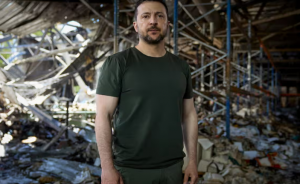The Ukraine president, Volodymyr Zelenskiy, has released a desperate video plea calling on world leaders to attend a “peace summit” next month in Switzerland, after a deadly Russian attack on a DIY hypermarket in Kharkiv on Saturday killed at least 14people and injured dozens more.
Zelenskiy appealed in particular to the US president, Joe Biden, and the Chinese leader, Xi Jinping, to attend the summit, which is due to start on 15 June. “Please, show your leadership in advancing the peace – the real peace and not just a pause between the strikes,” said Zelenskiy in English.
Biden has not yet confirmed his attendance and it is not known whether China will attend – “negotiations are ongoing” over Beijing’s participation, said Zelenskiy’s aide Mykhailo Podolyak in an interview last week.
Saturday’s strike came at the end of a week in which daily Russian missile and air strikes terrorised Ukraine’s second city, with hits on a printing house, numerous residential areas and a central park, among other targets. In most cases, there were no obvious military targets nearby.
The mayor of Kharkiv, Ihor Terekhov, said about 120 people had been in the hardware store on Saturday afternoon. “The attack targeted the shopping centre, where there were many people – this is clearly terrorism,” he said.
Prosecutors said at least 14 people had died, of whom 10 had not yet been identified, and 43 injured. A further 16 people are missing after the strike. A separate, early evening missile strike hit a residential building in the centre of the city, injuring 18 people, according to the regional governor.
In recent weeks, Russia has been working to make life misery for Kharkiv, a city 20 miles from the borderwith Ukraine, and which had a pre-war population of over a million. Although life in the city goes on, deadly strikes have become a daily feature of life.
Because of the proximity of the city to the border, Russian fighter jets can launch glide bombs into the city centre from inside Russia. Ukrainian officials say improved air defence systems and F16 fighter jets are vital components of defending the city. The Kharkiv region has also been the focus of a new Russian offensive over the last two weeks, centred on the town of Vovchansk, which has led to thousands of residents fleeing their homes.
Russia has claimed its attacks on Kharkiv region are aimed at creating a “buffer zone” to prevent Ukrainian forces from launching strike against Russian border regions.
The strike on Saturday targeted a popular suburban shopping complex. Andriy Kudinov, its director, told local media the store had been packed with shoppers buying items for their summer cottages.
Witnesses described a panicked scene at the supermarket. “I was at my workplace. I heard the first hit and … with my colleague, we fell to the ground. There was the second hit and we were covered with debris. Then we started to crawl to the higher ground,” Dmytro Syrotenko, 26, told Reuters, speaking with a large cut on his face.
The strike sparked a fire that sent large clouds of dark smoke billowing above the shopping centre, with firefighters brought in to fight the blaze. Rescue work is dangerous in these conditions, with repeat strikes targeting first responders a common feature of recent Russian attacks.
Zelenskiy on Sunday said it was further proof that Russia is not interested in peace. “We all know who are we dealing with. Russia is run by men who want to make it a norm – burning lives, destroying cities and villages, dividing people and erasing national borders through war. There is no nation that can stop such war alone,” he said.
Privacy Notice: Newsletters may contain info about charities, online ads, and content funded by outside parties. For more information see our Privacy Policy. We use Google reCaptcha to protect our website and the Google Privacy Policy and Terms of Service apply.
after newsletter promotion
Zelenskiy said more than 80 countries had already confirmed their attendance at the Swiss summit. Russia is not invited, and has rubbished the event as pointless. The aim appears not to devise a workable peace formula, but to put together a large coalition of countries to call on Moscow to end the war, particularly targeting many global south countries who have remained neutral up to this point.
Podolyak, a key Zelenskiy aide, said the Ukrainian president had been spending time making calls to numerous leaders of global south countries in an effort to persuade them to attend the summit, with particular focus on Africa, Latin America and the Pacific region.
“Russians are trying everything to discredit the idea and to offer incentives for not attending,” said Podolyak, hinting at the diplomatic battle over the summit.
China, which has tacitly backed Russia in the conflict, is thought unlikely to attend, though Ukrainian diplomats are trying hard to persuade Beijing to take part in some form. China has outlined its own peace plan, which Ukrainian officials say is unworkable.
“The Chinese formula is to either force the capitulation of Ukraine, or to freeze the conflict on Russia’s terms,” said Podolyak. “China is the key country [for us], because as soon as you change its position from neutral and disinterested to neutral but fair, then pressure on Russia will start to rise,” he added.
In a report published on Friday, Reuters cited unidentified sources in Moscow claiming that President Vladimir Putin is looking for a ceasefire deal. “Putin can fight for as long as it takes, but Putin is also ready for a ceasefire – to freeze the war,” said one of the sources.
Ukrainian and many western officials have reacted sceptically to such claims, noting that without real security guarantees for Ukraine, any attempt to freeze the conflict would be meaningless.
The guardian

